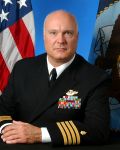WASHINGTON, May 20, 2011 — Stemming the incidence of post-traumatic stress disorder, or PTSD, requires awareness, education and recognizing its symptoms, a senior military psychiatrist said.
Navy Capt. Paul S. Hammer, director of the Defense Centers of Excellence for Psychological Health and Traumatic Brain Injury, spoke during a May 16 media roundtable event held here as part of Mental Health Month.
“[It’s important] to make sure people are aware, educated, and that they look for it in themselves, their friends and fellow service members. They must act on it so something is done,” Hammer said.
Taking action doesn’t necessarily call for a major intervention, he said. “Sometimes reaching out and talking to someone can put that person on the right path to get the help he needs,” he suggested.
Recognizing signs of the stress disorder early can be the key to successfully diagnose and treat affected individuals, he said.
“PTSD can be a really complicated entity,” he said. “People think it’s one thing, but it can manifest itself in a lot of different ways and contexts.”
PTSD is not gender-specific, and tell-tale signs vary from one person to the next, but Hammer said some factors might add up to the stress diagnosis. He said it’s important to recognize such symptoms as combat stress, substance abuse, talks of suicide and depression. Getting help begins with awareness and education at all levels of the military, he said.
Hammer said post-traumatic stress was once a condition discovered only after troops returned home following deployments. Now, however, the services include post-traumatic stress awareness instruction for new recruits in basic training, and warfighters are monitored for symptoms during their military careers.
“We’ve got to take care of ourselves and take care of each other,” Hammer said. “The idea of awareness is to take appropriate action and have the courage to reach out and take help.”
“The Army [incorporates awareness] in resilience training and comprehensive soldier fitness, and by training master resilience trainers,” he added. “So there’s a huge effort among the services to really develop a level of resilience.”
Combating the stigma attached to mental health counseling also is taught to service members as part of the military’s awareness campaign, Hammer said. For many people, the longtime stigma is an overwhelming barrier to diagnosis and treatment.
Denial of post-traumatic stress also can develop, which he described as a “tougher nut to crack.” Denial is a person’s perception that people are doing fine, Hammer added. “They don’t want to see themselves or be seen as weak, damaged or ill,” he said.
“I think huge headway has been made on stigma,” he said. “You see senior officers and senior enlisted members who are much more willing to speak out and talk about it. I can’t imagine a time, when I first came in, that I would hear a sergeant major talk about PTSD, and now it’s routine.”
“No doubt the stigma is still out there, but we’ve still made an enormous amount of progress,” Hammer said. “But there’s more to do. We’re not resting on our laurels. We’re still working on it.”
Source:
U.S. Department of Defense
Office of the Assistant Secretary of Defense (Public Affairs)

 von
von 
